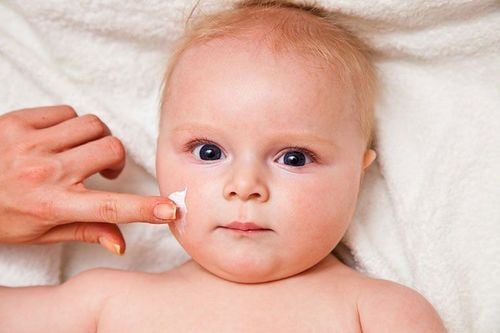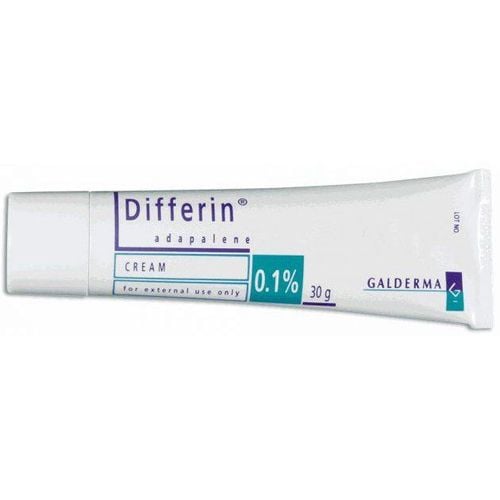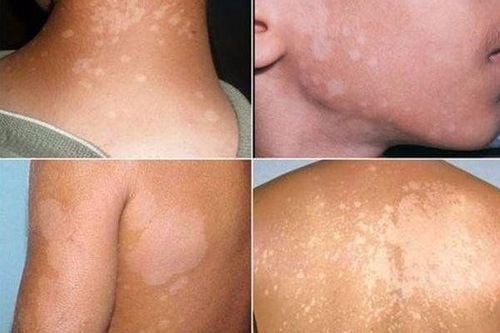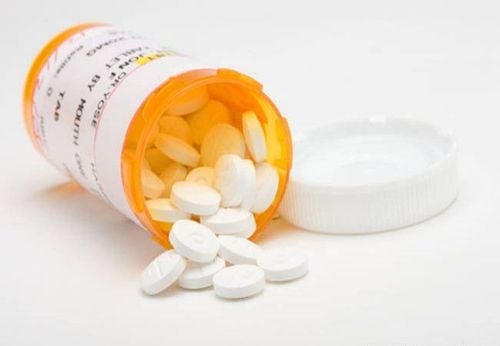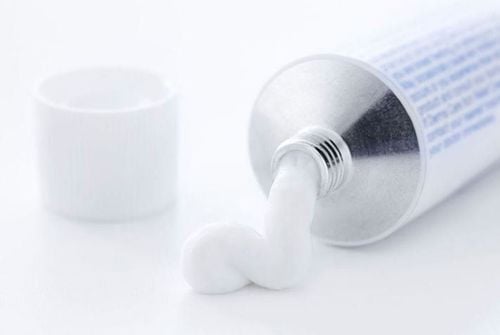This is an automatically translated article.
The article was professionally consulted with Specialist Doctor I Nguyen Thanh Van - Doctor of Internal Medicine - Dermatology - Department of Medical Examination & Internal Medicine - Vinmec Phu Quoc International General Hospital.If your skin is itchy and red for a long time, you most likely have eczema. This skin condition is seen in both children and adults. There are many different types of eczema, and each type has its own symptoms and triggers.
1. Atopic dermatitis
Atopic dermatitis is the most common form of eczema, which usually begins when we are children and is usually milder or goes away by adulthood. Atopic dermatitis is one of the allergic triad, along with asthma and allergic rhinitis. Many people suffer from all three of these allergies.Symptoms of atopic dermatitis include:
Rash in folds such as elbows or knees Skin in areas of rash may become lighter, darker, or thickened There may be blisters and oozing outbreak if blisters burst Children often develop a rash on the scalp and cheeks Skin can become infected if you scratch the cause of atopic dermatitis: Atopic dermatitis occurs when the skin's natural protective barrier is impaired weak, not resistant to irritants and allergens. Atopic dermatitis is caused by a combination of factors: genetics, dry skin, immunosuppression, and environmental factors.
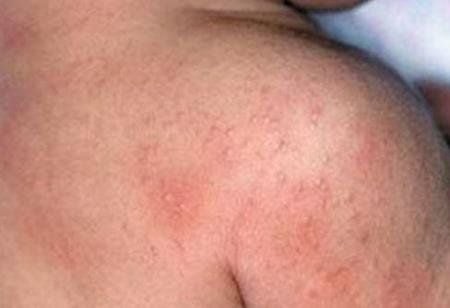
Viêm da dị ứng
2. Contact dermatitis
If your skin is red and itchy when you touch certain substances, it could be a sign of contact dermatitis. There are two types of contact dermatitis: allergic contact dermatitis when exposed to an allergenic material such as plastic or metal and irritant contact dermatitis when exposed to an irritating chemical or material. skin.Contact dermatitis has common symptoms including: itchy, red, burning and stinging skin, hives, blisters and crusting.
Causes of contact dermatitis : It occurs when touching a substance that irritates the skin or causes an allergic reaction. The most common agents are: cleaning agents, bleaches, jewelry, rubber, nickel, paints, ivy, poisonous plants, skin care products, soaps, perfumes , solvents and cigarette smoke.
3. Eczema in the form of leeches
This is a form of eczema with small blisters on your hands and feet, which is more common in women than men.The symptom of eczema is the appearance of tight blisters on the fingers, toes, palms, and soles of the feet. These blisters may be itchy or painful. Dry, cracked and flaky skin
Eczema can be caused by allergies, wet hands and feet, exposure to substances such as nickel, cobalt or chromium salts, and stress.
4. Indigo hands
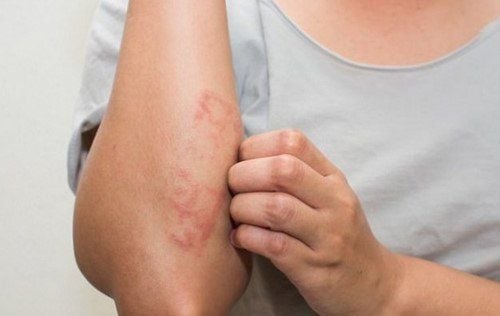
Bệnh chàm tay
5. Neurodermatitis
Neurodermatitis is similar to atopic dermatitis.Symptoms of neurodermatitis are thick, scaly patches of skin on the arms, legs, back of the neck, scalp, under the feet, back of the hands, or on the genitals. These areas of skin can be very itchy, especially when you are resting or sleeping. If scratched, they can bleed and become infected
Causes of neurodermatitis: Neurodermatitis often occurs in people with other types of eczema or psoriasis. The cause is unknown, but stress may be a factor in the onset of the disease.
6. Indigo coin
Manifestations are round, coin-shaped, itchy, scaly spots.Usually begins after an insect bite, or an allergic reaction after contact with metal, chemicals, or dry skin. This skin condition often co-occurs with another form of eczema, such as atopic dermatitis.
7. Stasis dermatitis

Viêm da ứ đọng
Causes of Stasis Dermatitis: It usually occurs in people who have problems with blood circulation in the lower legs. If the valves that push blood from the legs toward the heart are weakened, blood will pool in the legs, causing swollen legs and enlarged veins.
8. Treatment
You need to see a doctor and consult a doctor if the itchy and red skin persists or affects your quality of life. To assist your doctor in diagnosis and treatment, you should remember and provide information about the foods you have eaten, the types of irritants you have been exposed to, the time you showered, the water temperature and your stress. You also need to be aware of the association between daily activities and eczema, which will help uncover triggers.Eczema often comes and goes. When it does, you may need to try different medicines and take different treatments to prevent the disease from spreading. Some commonly used medications for treatment include:
Antiallergic drugs such as diphenhydramine can control the itching. Topical corticosteroids can reduce itching. For some more serious conditions, oral steroids may be needed. Calcineurin inhibitors such as tacrolimus (Protopic) and pimecrolimus (Elidel) help reduce the immune response that causes red, itchy skin. Antibiotics if there is a skin infection. Therapy (ultraviolet light) helps heal your rash. Refrigerating the skin before applying a corticosteroid cream can help it penetrate the skin more easily.
9. Tips to prevent eczema flare-ups
Here are some ways to prevent eczema flare-ups and to manage symptoms:Cool the skin or apply oatmeal or baking soda to relieve itching. Moisturises skin daily with an oil-based cream to create a protective barrier against irritants. The best time to apply the cream is right after taking a shower. After you shower, dry your skin gently with a soft towel, do not rub it. Avoid scratching as scratching can cause infection. Use fragrance-free, detergent-free products. Wear gloves and protective clothing when handling chemicals. Wear loose-fitting clothing made of soft fibers such as cotton. Avoid skin irritants. Eczema is a common skin disease that causes many unpleasant symptoms. Eczema comes in many forms. But all the different types of eczema tend to cause symptoms such as itching, redness, peeling of the skin surface, roughness, flaking, etc. Depending on the cause, eczema can flare up and cause severe symptoms, and it can also become a chronic disease with less intense symptoms.
Vinmec International General Hospital is one of the hospitals that not only ensures professional quality with a team of leading medical doctors, modern equipment and technology, but also stands out for its examination and consultation services. comprehensive and professional medical consultation and treatment; civilized, polite, safe and sterile medical examination and treatment space. Customers when choosing to perform tests here can be completely assured of the accuracy of test results.
Please dial HOTLINE for more information or register for an appointment HERE. Download MyVinmec app to make appointments faster and to manage your bookings easily.
Article reference source: webmd.com, healthline.com



